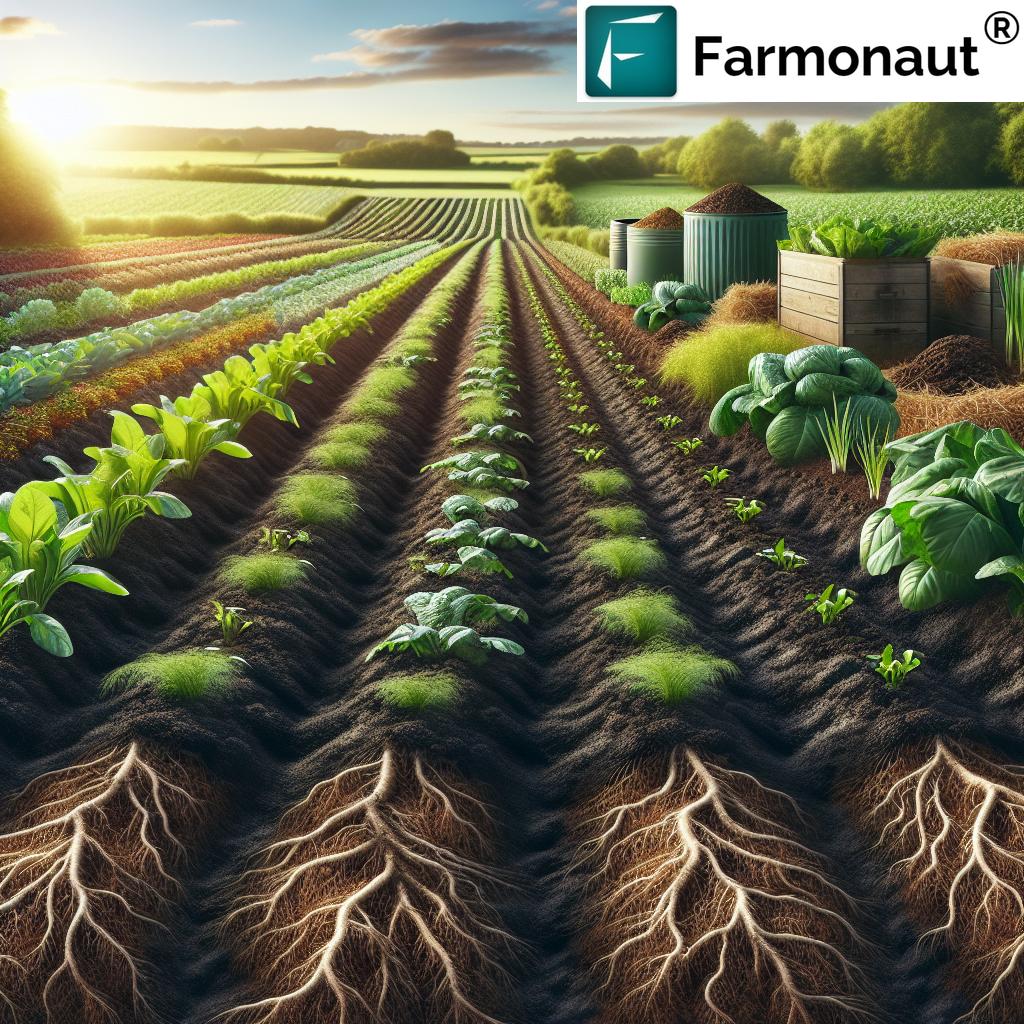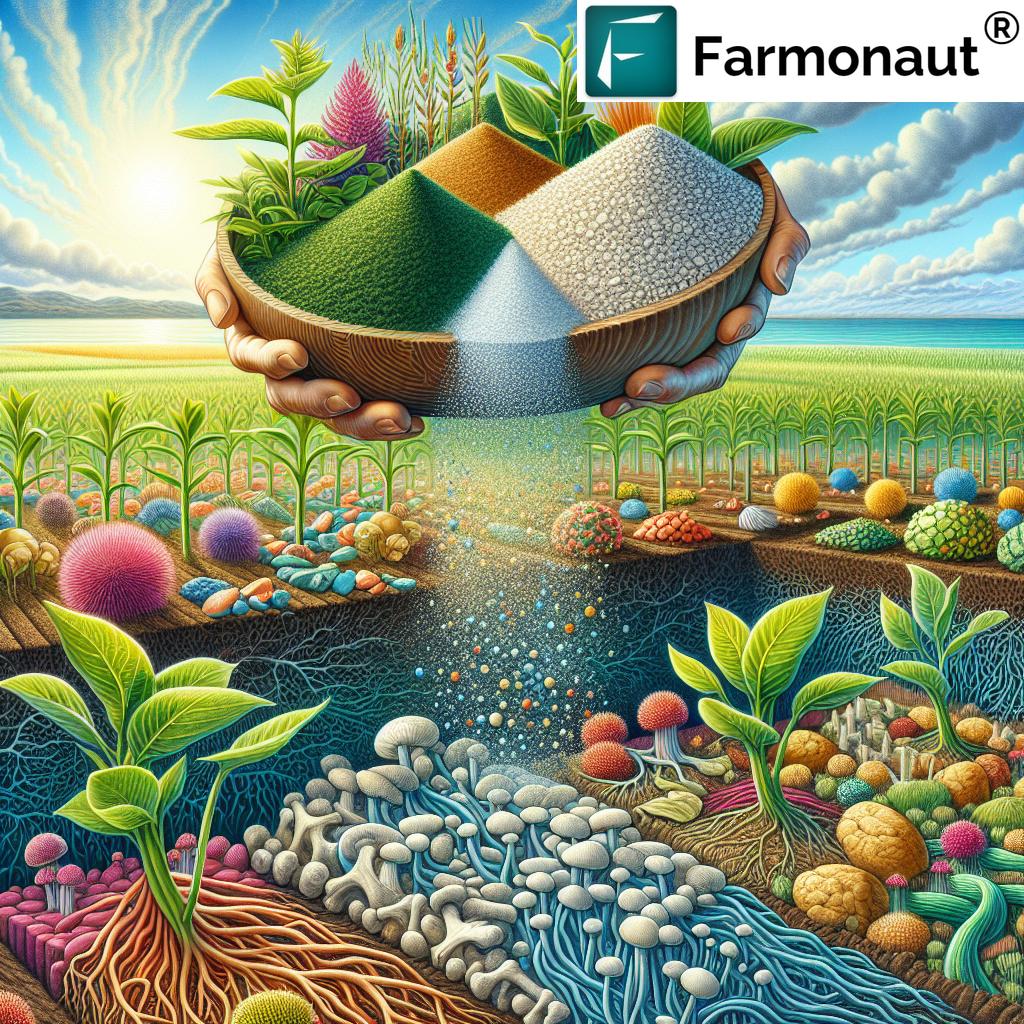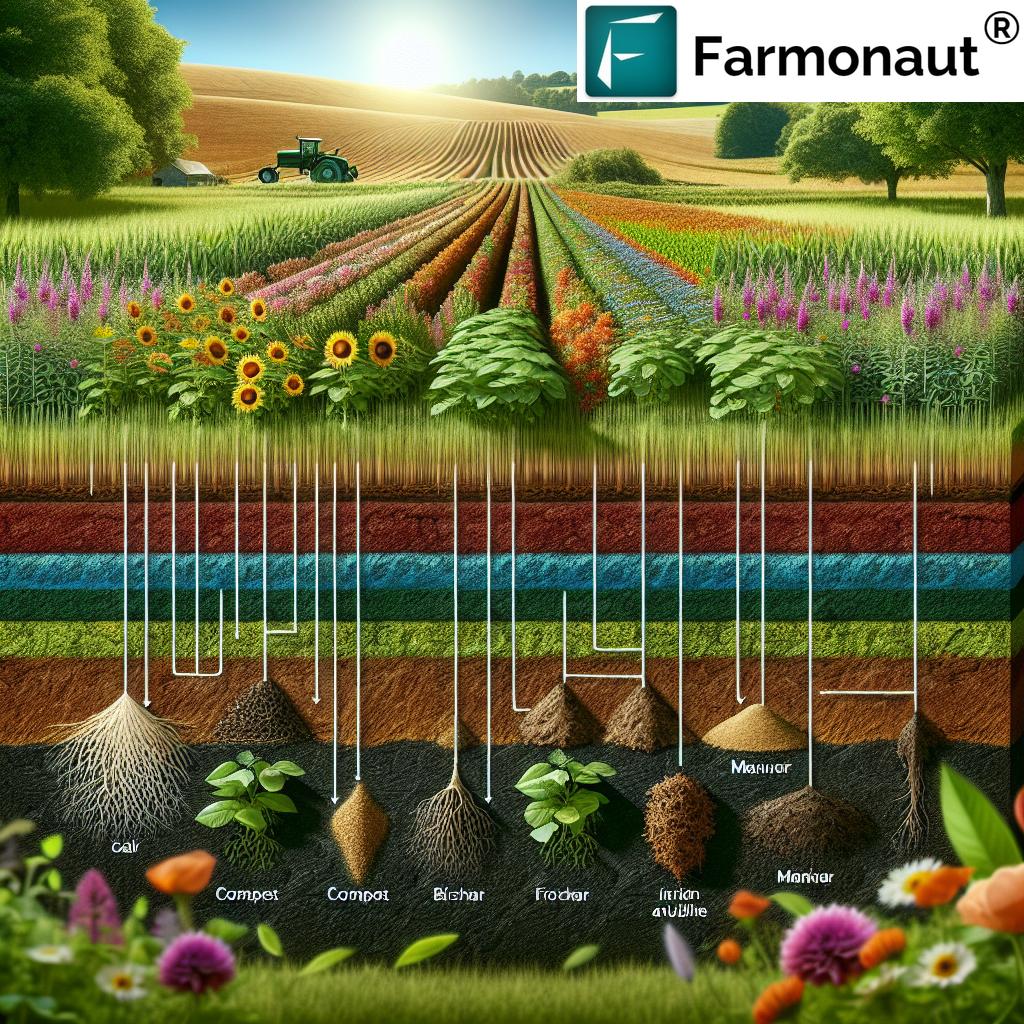Organic Fertilizer: 7 Powerful Benefits for Sustainable Soil
Organic fertilizers are natural substances derived from plant and animal materials, used to enrich soil fertility and promote sustainable agricultural practices. Unlike synthetic fertilizers, which are chemically manufactured, organic fertilizers offer a holistic approach to soil management, enhancing both soil health and plant growth.
Table of Contents
- Introduction
- Types of Organic Fertilizers
- 7 Powerful Benefits of Organic Fertilizer for Sustainable Soil
- Application Methods: Best Practices for Organic Fertilizers
- Farmonaut: Smart Technologies for Organic and Sustainable Farming
- Comparison Table: Organic vs. Chemical Fertilizers
- Challenges and Considerations
- Frequently Asked Questions
- Conclusion
- Farmonaut Subscription Plans
“Organic fertilizers can increase soil organic matter by up to 30%, boosting long-term soil fertility and sustainability.”
Introduction: Why Organic Fertilizer Matters for Sustainable Soil
As we navigate the challenges of modern agriculture and climate change, the choices we make in soil management and fertilizer use have never been more critical. The conversation about organic fertilizers is more than just a trend—it’s a movement towards holistic, sustainable, and environmentally sound agricultural practices.
At Farmonaut, we deeply understand how enriching soil with natural substances supports resilience, enhances biodiversity, and lays the foundation for healthy, productive crops. In this comprehensive guide, we’ll dive into the various forms of organic fertilizers, their “7 powerful benefits,” sustainable application techniques, smart technological integration, and practical considerations to empower a new generation of environmentally responsible farmers.
Types of Organic Fertilizers: Animal, Plant, and Mineral-Based Solutions
One of the greatest advantages of organic fertilizers is their diversity. They can be categorized based on their origin, allowing us to choose the best fit for our soil and plant needs. Understanding these categories lays the groundwork for effective soil management and sustainable agriculture practices.
1. Animal-Based Organic Fertilizers
Animal-based fertilizers are derived from livestock and their by-products. They include manures from cattle, poultry, and horses, as well as processed products like bone meal, blood meal, and fish meal.
- Manures: Rich in nitrogen, phosphorus, potassium, and organic matter, manure improves soil structure, water retention, and microbial activity.
- Bone Meal: Supplies phosphorus, calcium, and supports strong root systems and abundant flowering.
- Blood Meal: Contains high nitrogen, boosting leafy growth in plants.
- Fish Meal: Provides trace elements and growth hormones for improved resilience and nutrient uptake.
2. Plant-Based Organic Fertilizers
Plant-based fertilizers are derived from organic plant materials, providing a sustainable cycle of natural soil enrichment.
- Compost: Made from decomposed plant waste (compost benefits for soil), it enhances soil structure, increases water retention, and fosters beneficial microbial activity.
- Green Manure: Involves growing green crops (such as legumes), which are then incorporated into the soil to add organic matter and vital nutrients.
- Seaweed Fertilizers: These extracts are rich in trace minerals and growth-promoting hormones, improving soil texture and plant resilience.
3. Mineral-Based Organic Fertilizers
Some organic fertilizers are sourced from naturally occurring minerals, delivering essential nutrients in a slow, controlled manner for sustainable soil improvement.
- Rock Phosphate: A slow-release source of phosphorus, pivotal for root development and flowering.
- Wood Ash: Provides potassium, trace elements, and helps enhance soil fertility and structure.
Relevant Examples: Choosing the Right Organic Fertilizer
- Cattle manure for vegetable gardens
- Poultry manure for fast-growing crops
- Bone meal for flowering and fruiting plants
- Seaweed extract for boosting soil trace minerals in coastal regions
- Compost for improving soil fertility in orchards
7 Powerful Benefits of Organic Fertilizer for Sustainable Soil
Let’s explore how incorporating organic fertilizers delivers far-reaching advantages, both for farmers and the planet.
1. Improving Soil Fertility and Health
Organic fertilizers enrich soil with organic matter and essential nutrients, leading to improved fertility and long-lasting plant productivity. Over time, the consistent addition of organic materials increases soil organic matter, which:
- Strengthens root systems and supports healthier plant development
- Enhances nutrient retention and availability for crops
- Promotes beneficial microbial activity crucial for nutrient cycling
2. Enhancing Soil Structure and Water Retention
One of the core benefits of organic fertilizers is their positive impact on soil structure. As organic materials decompose:
- The soil becomes more friable, improving aeration and water retention
- Drainage improves in clay-heavy soils, while sandy soils gain better moisture holding capacity
- These effects create the ideal environment for robust root systems
This property is vital for areas that struggle with water scarcity or excessive rainfall—compost benefits for soil are particularly pronounced in such scenarios.
Discover the importance of soil organic carbon and how targeted monitoring supports organic farming and climate resilience.
3. Supporting Soil Biodiversity and Microbial Activity
Organic fertilizers support a thriving microbial population by providing carbon-based food sources for soil organisms. Enhanced biodiversity in the soil brings numerous benefits:
- Accelerates nutrient cycling
- Improves disease suppression through competitive exclusion
- Fosters symbiotic relationships with plants, such as nitrogen-fixing bacteria
Building a resilient, biodiverse soil ecosystem is foundational to modern, sustainable agriculture practices.
4. Minimizing Nutrient Leaching with Slow Release Organic Nutrients
While synthetic fertilizers tend to release nutrients rapidly—leading to runoff and pollution—organic fertilizers release nutrients gradually. This slow release ensures:
- A steady supply of nitrogen, phosphorus, and potassium over extended periods
- Minimized leaching into waterways, protecting aquatic ecosystems
- Lower risk of nutrient burn in crops
This gradual release is why improving soil fertility with organic inputs is considered more sustainable for the long run.
5. Boosting Plant Resilience and Growth
With a strong, biologically active soil foundation, plants become more resilient to stress. This resilience benefits growth and long-term crop health:
- Green and animal-based organic fertilizers provide trace minerals and growth hormones crucial for stress management
- Seaweed extracts can enhance root recovery post-drought or pest attack
- Overall vitality and yield are enhanced thanks to robust nutrition
6. Contributing to Climate Change Mitigation and Organic Farming
A lesser-known but highly impactful benefit is how organic fertilizers promote carbon sequestration. This plays a significant part in climate change and organic farming initiatives by:
- Increasing soil organic carbon content
- Helping soils actively store atmospheric carbon dioxide
- Improving soil resilience to droughts and heatwaves brought by climate change
Explore in-depth carbon monitoring and sustainability features through Farmonaut’s Carbon Footprinting tools, enabling farmers and institutions to measure and reduce their carbon impact.
7. Ensuring Long-Term Sustainability and Environmental Protection
Organic fertilizers form the bedrock of sustainable agriculture, with a ripple effect across food production, water conservation, and ecosystem protection:
- Reduce chemical runoff, safeguarding water resources (see trivia below)
- Encourage a closed-loop system by recycling plant and animal wastes
- Create a pathway towards “regenerative” agricultural practices
“Using organic fertilizers reduces chemical runoff by approximately 50%, helping protect local water sources and ecosystems.”
See how real-time organic carbon tracking supports sustainable soil management and climate change resilience.
Application Methods: Best Practices for Organic Fertilizers
To maximize the impact of organic fertilizers, it’s essential that we apply them thoughtfully, accounting for their properties, climate, and specific plant needs. Here’s how we can get the best results:
Composting: The Gold Standard
- Producing compost by decomposing organic matter stabilizes nutrient content and minimizes over-fertilization risk.
- Compost can be applied as a soil amendment or mulch—improving soil texture, structure, and feeding plant-based fertilizers.
- Integrating compost increases water retention and supports beneficial soil biology, resulting in soil and plant system balance.
Green Manuring: Growing and Adding Organic Matter
- Green manure crops (such as legumes, clover, vetch) are grown and then tilled directly into the soil, adding fresh organic matter and nutrients like nitrogen.
- This method is powerful for restoring depleted fields or as part of rotational cropping systems in sustainable agriculture.
Direct Application: Specialized Organic Inputs
- Some animal-based fertilizers (bone meal, fish emulsion) can be broadcast or incorporated directly based on soil needs and crop stage.
- Liquid organic fertilizers like seaweed extracts can be used as foliar sprays for targeted plant support.
Best Practices for Application
- Test your soil: Always assess nutrient status before application.
- Match input to crop: Use high-nitrogen sources for leafy crops, phosphorus-rich organics for root and fruiting crops.
- Apply at the right time: Integrate organics before planting or during slow release growth phases.
- Incorporate materials well: Tilling or mulching ensures even distribution and minimizes volatilization losses.
Utilize Farmonaut’s Large Scale Farm Management App for data-driven timing and application of your fertilizer regime—maximizing soil and crop returns.
Farmonaut: Smart Technologies for Organic and Sustainable Farming
Technology is transforming modern agriculture. At Farmonaut, our mission is to make precision agriculture accessible to every farmer, big or small, with a focus on sustainability and resource optimization.
Satellite-Based Crop and Soil Health Monitoring
- Using satellite imagery and AI, we analyze vegetation health, soil moisture, and nutrient levels in real time.
- This helps make informed decisions on fertilizer application, irrigation, and pest control—optimizing yield and reducing wastage.
- Our Jeevn AI Advisory System gives tailored crop recommendations for both organic and conventional growers.
Monitor and improve soil fertility with precision by accessing these insights on the Farmonaut App:
Real-Time Carbon Tracking & Compliance
Farmonaut’s carbon footprinting module enables farms to measure, benchmark, and reduce their carbon emissions. Easy-to-interpret dashboards support eco-conscious marketing and compliance initiatives.
Explore more: Farmonaut Carbon Footprinting
Blockchain Product Traceability for Eco-Friendly Crops
For sustainable brands or cooperatives exporting organic produce, Farmonaut’s blockchain-based product traceability ensures complete, transparent tracking from soil to shelf—building consumer trust and minimizing fraud in supply chains.
Fleet, Logistics, and Resource Management
Our fleet management tools help large farms and agri-enterprises optimize movement of fertilizer, equipment, and harvests, reducing costs and carbon footprint.
API Access for Developers and Researchers
Integrate Farmonaut’s satellite, weather, and soil data into your research or agri-products using our powerful APIs. Learn more: Farmonaut API | API Developer Docs
Comparison Table: Organic vs. Chemical Fertilizers – Benefits for Sustainable Soil
| Fertilizer Type | Nutrient Release Rate | Estimated Soil Health Improvement (%) | Environmental Impact | Sustainability Level | Plant Growth Effect | Example Sources |
|---|---|---|---|---|---|---|
| Organic Fertilizer | Slow, steady; matches plant demand | 10–20% increase in soil organic matter over 3 years. 15–40% increase in microbial activity. |
Very low chemical runoff, Supports ecosystem health, Builds soil structure |
Very High – supports long-term fertility and resilience. | Gradual but steady; improves stress tolerance, root and shoot growth. | Compost, green manure, bone meal, seaweed extract, manure, rock phosphate |
| Chemical Fertilizer | Fast, immediate | Increase in plant-available nutrients, but may degrade soil structure over time. Microbial activity shows small or negative changes. |
High risk of leaching and water pollution, May harm beneficial microbes |
Low – can result in long-term fertility loss, higher environmental costs | Rapid, visible greening and growth; risk of burn or decline with misuse. | Urea, NPK blends, superphosphate, ammonium nitrate |
Challenges and Considerations in Using Organic Fertilizers
Transitioning to organic fertilizers, while highly beneficial, does come with its own set of challenges for farmers and growers. Understanding these helps us plan better and maximize the advantages.
- Nutrient Content Variability: Unlike standardized synthetic products, the nutrient content in manure, compost, or plant-based organics can vary widely. Conducting soil tests and periodic nutrient analyses is crucial.
- Labor and Time Intensive: Producing compost, managing manure, or growing green manures requires labor and attention—not always feasible for all operations.
- Costs: Depending on supply and processing, certain organic fertilizers (like commercial bone or fish meal, seaweed extracts) can be pricier than bulk synthetic options.
- Access and Logistics: Some regions face limited access to quality organic materials or face transport/storage challenges for bulky fertilizers.
It’s important for us to balance these challenges with the ecosystem and productivity benefits detailed throughout this article.
Choose the Right Farmonaut Subscription for Precision and Sustainability
Whether you’re a smallholder, a commercial enterprise, or an agricultural researcher, Farmonaut offers flexible, scalable plans. Gain live insights into your soil, crops, and sustainability impact—all in one intuitive dashboard. Stay connected anywhere via Android, iOS, web, and API integration.
Frequently Asked Questions: Organic Fertilizer
What are organic fertilizers and how are they different from synthetic fertilizers?
Organic fertilizers are natural substances derived from plant, animal, or mineral sources. Unlike synthetic fertilizers, which are chemically manufactured, organics are minimally processed and enrich soil by adding organic matter and naturally occurring nutrients.
How do organic fertilizers help in improving soil fertility?
Organic fertilizers increase organic matter, support beneficial microbes, and improve soil structure. This leads to better nutrient and moisture retention, stronger root systems, and healthier plant growth.
Do organic fertilizers provide all the nutrients my crops need?
They often supply a diverse range of macro- and micronutrients (N, P, K, trace minerals) but may require mixing or supplementation depending on crop needs. Soil testing is recommended to optimize application.
Can organic fertilizers help with climate change mitigation?
Yes, because they increase soil organic carbon, support carbon sequestration, and dramatically reduce greenhouse gas emissions compared with chemical-intensive agriculture.
What’s the best way to apply organic fertilizers?
Composting and green manuring work well for most scenarios. Direct application of bone meal, seaweed, or fish emulsion can target specific nutrients for certain crops. Timing and even distribution are key.
Conclusion: Organic Fertilizer—A Solution for Sustainable, Resilient Soils
As we look toward a greener, healthier future, organic fertilizers offer unmatched advantages for farmers and the environment alike. By improving soil fertility, enhancing structure, promoting biodiversity, and mitigating climate change, they form an integral part of today’s sustainable agriculture practices.
While we must be mindful of the challenges in their use, the long-term benefits to crop health, environmental protection, and productivity are clear. Combined with smart decision tools from Farmonaut, our journey toward natural soil enrichment, carbon resilience, and food security is both practical and achievable.
Begin your sustainable farming journey—opt for organic fertilizers and harness precision agriculture with Farmonaut.










